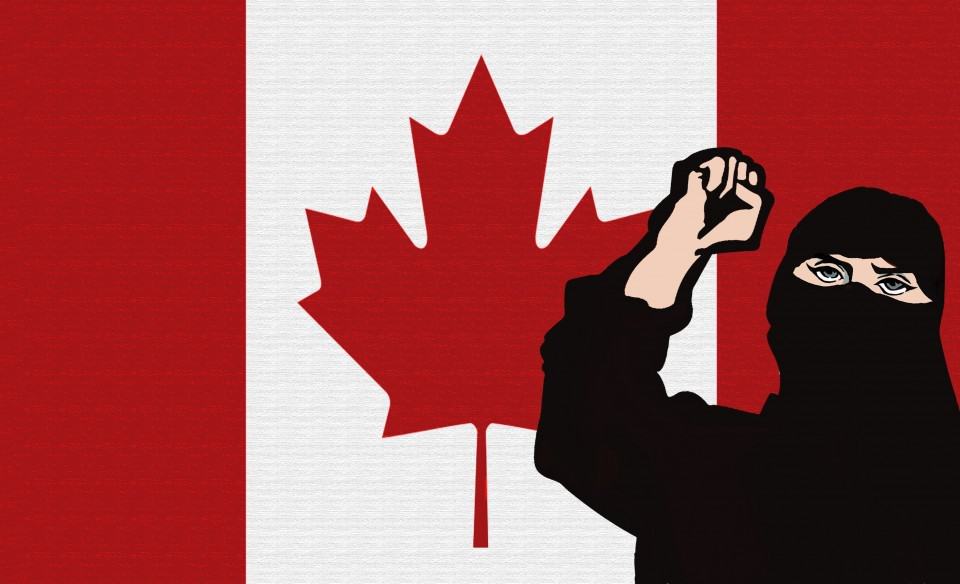[dropcap]After[/dropcap] fighting for months for her right to take the oath of Canadian citizenship while wearing a niqab, Sunera Ishaq has finally done so. The result of her case should not surprise us, since our Constitution protects freedom of religion and of expression. What should surprise us, however, is that the niqab has become an important issue leading up to today’s federal election.
On a strictly practical level, the niqab is a non-issue. For those concerned that the niqab prevents citizens from being identified during the citizenship ceremony, rest assured that women have always been obliged to uncover their faces to take the citizenship oath — it is merely done in private and before the ceremony.
As such, there seems to be little practical reason to make the requirement of bare faces a federal election issue. The intense discussion around the niqab, then, indicates something greater is at stake — namely, contestations over Canadian identity.
It is important to begin with the facts. In a Toronto Star article, Ishaq outlined her personal reasons for wanting to wear the niqab while reciting her citizenship oath, and it is clear that Ishaq is making a personal choice to wear it. Despite this, public discussions, including federal election debates, continue to ignore Ishaq’s voice and choice on the matter.
Prime Minister Harper’s comments during the French-language election debate epitomize this exclusion. Specifically, he mischaracterized the situation by saying: “Never will I say to my daughter that a woman has to cover her face because she’s a woman.” He shifted the conversation away from the issue under discussion — Ishaq’s freely made choice — and toward a hypothetical scenario in which Muslim Canadian women are forced to cover their faces, presumably by Muslim men.
If the Prime minister’s daughter’s rights must be dragged into a federal election debate at all, we should consider what would happen if she chose to cover her face in public — would her father forbid her from doing so? If he did, he would be exercising the same control over women’s bodies that he is condemning; if he didn’t, then there is no reason for him to categorically condemn women who choose to wear the niqab.
What is more, even if Ishaq felt external pressure to wear the niqab, this is not in itself sufficient grounds for Canada to ban the garment. There is an important discussion to be had regarding patriarchal forces controlling women’s bodily autonomy, but it is questionable why this critique has been limited to the niqab. Women are routinely pressured by partners, friends, or society at large to wear potentially harmful or limiting clothes and ornamentation. Yet, it does not follow that Canada should ban women from wearing these things altogether.
Some may claim that this disparity arises because the niqab itself is “un-Canadian.”Suffice it to say, however, Canada is a liberal democratic society in which what it means to be Canadian is, and should, constantly be shifting.
Remember that there is more at stake here than an election. In the final stretch of the federal campaign, this discussion has directed crucial time and resources away from other pressing issues, such as unemployment, student debt, or the future of our environment.
This misframing also generates a fear and distrust of Islam, with serious consequences. In Montreal last week, two teenage boys approached a pregnant Muslim woman, Oumessad Khafouche, pulling her hijab and knocking her to the ground. Around the same time, a man assaulted a niqab-wearing woman, Safira Merriman, in front of her two children at Toronto’s Fairview Mall.
It is a student issue when identifiably Muslim women are made to feel unsafe in this city. It is a labour issue when Muslim workers at Fairview Mall, and across Canada, must live with Islamophobic violence where they work. It goes without saying that it is a gender issue when women are targeted for violence because of the way they dress. If the considerable anti-niqab sentiment in Canada were genuinely about the safety and wellbeing of Muslim women, then Muslim women would not be such frequent targets of Islamophobic violence as the election draws closer.
So, if you truly care about Muslim women, listen to us. Speak against the rhetoric that fuels violence against us, and on October 19, vote according to your conscience. We can’t afford anything less.
Rusaba Alam is a third-year student at Victoria College studying English.


